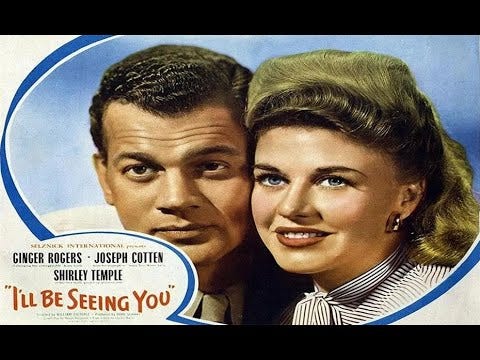Christmastide is still here, and so are our Christmas offers at Word & Song!
The more we’ve seen of films made either in England or the United States during that Golden Age, from about 1935 to 1965, the more it strikes us that a lot of them were set at Christmastime, and of those, quite a few were not about getting presents, but about giving of oneself during the holy season — and no one needed to be reminded that it was holy. There really are quite a few, far more than the ones you may be used to seeing re-run every year. Here is one, our Film of the Week, I’ll Be Seeing You.
The situation again is one that calls upon one of the quieter forms of charity, which is tact, that “touch” that makes people comfortable, or that at least spares them pain. It’s the Christmas season, coming up on the New Year, and a young woman, Mary Marshall (Ginger Rogers) has been given a furlough from the state prison, where she is serving a six-year term for manslaughter. We aren’t told, until about twenty minutes into the film, any of the details of the crime, if indeed it was a crime at all. On the train back to Pinehill, where her aunt and uncle live — she does not have a home of her own — she happens to be sitting next to a sergeant just released from an army psychiatric ward. The second world war is on, and he’s been treated for shell-shock. We can pick up a little of his trouble in the twitching of his right hand, and his shyness, bordering on stolidity, whenever anybody tries to talk to him about the war. This fellow, Zack Morgan (Joseph Cotten), has no home, either. We later find out that he grew up in an orphanage.
He and Mary have a nice conversation on that train, and when she tells him that she’s getting off at Pinehill, he says that that’s a coincidence, because that’s where he’s stopping too, to visit his sister. She’s told him that she’s a traveling saleslady. Well, he has no sister — he has to stay in a clean but bare room at the YMCA. And she is due back in prison in eight days. But she gives him her uncle’s name and address, and sure enough, the Marshalls being good and generous people, especially when it comes to the boys in uniform, they invite him over for supper.
They have only a few days, but neither one knows about the condition of the other. Meanwhile, we’ve got Mary’s family, which include Uncle Henry (Tom Tully), Aunt Sarah (Spring Byington), and Mary’s cousin Barbara (Shirley Temple), a 17-year-old girl who is gaga for every soldier she sees. They try their hardest, and mostly succeed, in making Mary and then Zack feel welcome. But the clock is running.
I’ve long said that I’d take Ginger Rogers over Fred Astaire any day of the week for acting and for singing; and Ginger could dance a little, too! I’ll Be Seeing You shows her at her best in a dramatic rather than comic role, and as for Joseph Cotten, his slight air of aristocratic gentility makes him a dead-on choice for the sensitive and lonely sergeant. Spring Byington and Tom Tully do not appear as if they are acting at all; it is as if they just stepped right into small town America. If you like to see the drama of goodness hurt by life but still good, this is a film for you.
PS: If you love the song of the same name, as Debra does, you might recall her discussion of it here.
A printable gift certificate is available below for your use!





I was looking for a movie to watch while finishing up my jigsaw puzzle and took your suggestion to watch this unknown-to-me gem. A really wonderful film.
And ... "I'll Be Seeing You" is one of the love great songs from (in my humble opinion) The Golden Age of American Popular Music (which encompasses about the same time as The Golden Age of Hollywood -- 1935 to 1965 ... for me, American popular music has deteriorated into mostly garbage since 1965).